
-
 Back to black: Philips posts first annual profit since 2021
Back to black: Philips posts first annual profit since 2021
-
South Korea police raid spy agency over drone flight into North

-
 'Good sense' hailed as blockbuster Pakistan-India match to go ahead
'Good sense' hailed as blockbuster Pakistan-India match to go ahead
-
Man arrested in Thailand for smuggling rhino horn inside meat
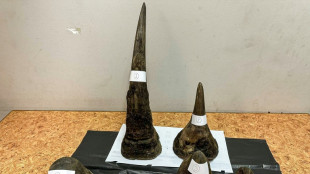
-
 Man City eye Premier League title twist as pressure mounts on Frank and Howe
Man City eye Premier League title twist as pressure mounts on Frank and Howe
-
South Korea police raid spy agency over drone flights into North

-
 Solar, wind capacity growth slowed last year, analysis shows
Solar, wind capacity growth slowed last year, analysis shows
-
'Family and intimacy under pressure' at Berlin film festival
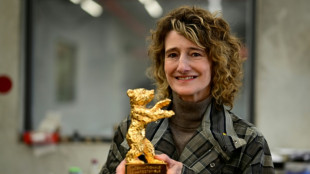
-
 Basket-brawl as five ejected in Pistons-Hornets clash
Basket-brawl as five ejected in Pistons-Hornets clash
-
January was fifth hottest on record despite cold snap: EU monitor

-
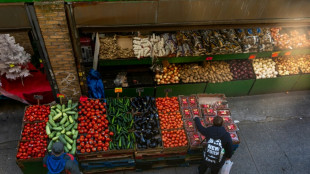 Asian markets extend gains as Tokyo enjoys another record day
Asian markets extend gains as Tokyo enjoys another record day
-
Warming climate threatens Greenland's ancestral way of life
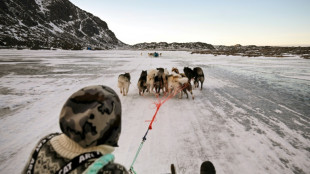
-
 Japan election results confirm super-majority for Takaichi's party
Japan election results confirm super-majority for Takaichi's party
-
Unions rip American Airlines CEO on performance

-
 New York seeks rights for beloved but illegal 'bodega cats'
New York seeks rights for beloved but illegal 'bodega cats'
-
Blades of fury: Japan protests over 'rough' Olympic podium

-
 Zelensky defends Ukrainian athlete's helmet at Games after IOC ban
Zelensky defends Ukrainian athlete's helmet at Games after IOC ban
-
Jury told that Meta, Google 'engineered addiction' at landmark US trial

-
 Despite Trump, Bad Bunny reflects importance of Latinos in US politics
Despite Trump, Bad Bunny reflects importance of Latinos in US politics
-
Gaming Realms PLC Announces FY25 Pre-Close Trading Update

-
 Caledonia Mining Corporation Plc - Issue of Securities Pursuant to Long Term Incentive Plan Awards
Caledonia Mining Corporation Plc - Issue of Securities Pursuant to Long Term Incentive Plan Awards
-
Hemogenyx Pharmaceuticals PLC Announces Issue of Equity

-
 How Fort Myers Dentists Create Long-Term Care Plans for Healthy Smiles
How Fort Myers Dentists Create Long-Term Care Plans for Healthy Smiles
-
Nikon Introduces the ACTION and ACTION ZOOM Binoculars

-
 Australian PM 'devastated' by violence at rally against Israel president's visit
Australian PM 'devastated' by violence at rally against Israel president's visit
-
Vonn says suffered complex leg break in Olympics crash, has 'no regrets'

-
 YouTube star MrBeast buys youth-focused banking app
YouTube star MrBeast buys youth-focused banking app
-
French take surprise led over Americans in Olympic ice dancing

-
 Lindsey Vonn says has 'complex tibia fracture' from Olympics crash
Lindsey Vonn says has 'complex tibia fracture' from Olympics crash
-
US news anchor says 'hour of desperation' in search for missing mother

-
 Malen double lifts Roma level with Juventus
Malen double lifts Roma level with Juventus
-
'Schitt's Creek' star Catherine O'Hara died of blood clot in lung: death certificate

-
 'Best day of my life': Raimund soars to German Olympic ski jump gold
'Best day of my life': Raimund soars to German Olympic ski jump gold
-
US Justice Dept opens unredacted Epstein files to lawmakers

-
 Epstein taints European governments and royalty, US corporate elite
Epstein taints European governments and royalty, US corporate elite
-
Three missing employees of Canadian miner found dead in Mexico

-
 Meta, Google face jury in landmark US addiction trial
Meta, Google face jury in landmark US addiction trial
-
Winter Olympics organisers investigate reports of damaged medals

-
 Venezuela opposition figure freed, then rearrested after calling for elections
Venezuela opposition figure freed, then rearrested after calling for elections
-
Japan's Murase clinches Olympic big air gold as Gasser is toppled

-
 US athletes using Winter Olympics to express Trump criticism
US athletes using Winter Olympics to express Trump criticism
-
Japan's Murase clinches Olympic big air gold

-
 Pakistan to play India at T20 World Cup after boycott called off
Pakistan to play India at T20 World Cup after boycott called off
-
Emergency measures hobble Cuba as fuel supplies dwindle under US pressure

-
 UK king voices 'concern' as police probe ex-prince Andrew over Epstein
UK king voices 'concern' as police probe ex-prince Andrew over Epstein
-
Spanish NGO says govt flouting own Franco memory law
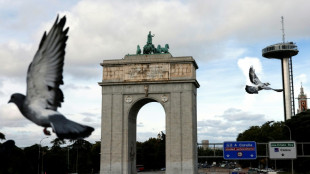
-
 What next for Vonn after painful end to Olympic dream?
What next for Vonn after painful end to Olympic dream?
-
Main trial begins in landmark US addiction case against Meta, YouTube

-
 South Africa open T20 World Cup campaign with Canada thrashing
South Africa open T20 World Cup campaign with Canada thrashing
-
Epstein accomplice Maxwell seeks Trump clemency before testimony


Once the enemy, majestic condor wins hearts of Colombian farmers
A group of condors rip into the carcass of a calf at the top of a Colombian mountain which rises 4,200 metres above sea level.
Their meal is a peace offering from local ranchers working to improve their relationship with the world's largest bird of prey, dubbed the King of the Andes.
"It's a bird that, when you see it flying, is so beautiful," said Diana Bautista, of the white-collared creature with a wingspan that can reach up to three metres, tipped by fingerlike feathers.
In the mountainous northeastern municipality of Cerrito where she lives, the condor has not always been looked upon fondly.
Up until a few years ago, villagers would leave out poisoned carrion or shoot at them to scare off the scavenger seen as a threat to their livestock.
A group of 19 families living high up in the moorlands of the Andes, a unique mountain ecosystem, in 2019 formed the ACAMCO association to protect and boost appreciation of the bird.
Now, residents have learned to build pens to protect their most vulnerable livestock, and platforms in the mountains where they leave carrion for the winged giants.
The community initiative is aimed at "protecting and learning about" the bird, which "attracts a lot of people" and could also have an economic benefit for the region, said Andrea Florez, from ACAMCO.
"We must not believe all the bad things that are said about the condor," said Bautista.
"Not everyone is lucky enough to have this bird in their country (...) we must love it."
- 'A great loss' -
Acamco is supported by the Jaime Duque Foundation, a Colombian non-profit organization, which buys weak or sick animals from breeders to give to the condor, in order to study its eating habits using camera traps.
Condors used to feed on small animals, but human activity has chased away their usual prey and they have become dependent on livestock, said Francisco Ciri, a biologist and director of the Neotropical conservation foundation.
The Andean Condor is considered vulnerable by the International Union for Conservation of Nature (IUCN), which lists its population of mature individuals at just over 6,700 and decreasing.
There are only 60 left in Colombia, according to a 2021 national census by the Neotropical Foundation.
Their main threat is deliberate poisonings by humans, says the IUCN.
The death of a single condor is "a great loss" for the species because it reproduces so slowly, said Carlos Grimaldos, an expert with the Jaime Duque Foundation.
The condor reaches sexual maturity at the age of 10 and only gives birth to one chick every two or three years.
Protecting it is essential as the scavenger "cleans" the moorlands by eating dead animals and prevents contamination of water sources, said Grimaldos.
With binoculars in hand, Grimaldos teaches visitors at a reserve run by the foundation to distinguish the condor from other raptors.
The condor finds itself "in an increasingly critical situation" throughout the Andes, said Guillermo Wiemeyer, an Argentine researcher attending a meeting of the South American Condor Network in the province of Santander.
Experts from Chile, Argentina, Bolivia, Ecuador, Colombia, Peru and Venezuela created the network a decade ago to try and protect the condor, already considered extinct in Venezuela.
Alexcevith Acosta, director of Santander's environmental authority, said it is urgent to hold a census throughout Latin America as "condors know no borders."
F.Pedersen--AMWN

